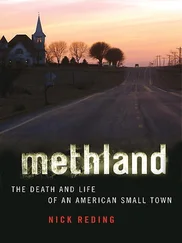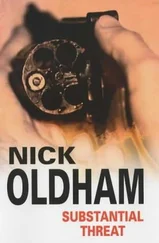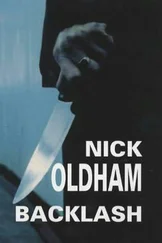He must seem to come from nowhere, the clap of sound and then the light: a ghost rider — or so he hoped — like the ones in the song. He roared past them, down to the town and the flames.
The endless line of refugees flew by, occasional single faces sticking briefly in his vision, their desperation or fatigue or plain boredom filling his mind for an instant before being swallowed by the sound of the road and the certainty which he felt now.
This was rash. There was no cloud cover, no concealment. If NatProMan was watching, they would see him, they would be able to trace him back to the house — although the house was full now, he realised, rather than empty, and his address would yield nothing more than confusion. The refugees sheltered him even as he sheltered them.
He had learned from watching Shola’s body fall: a single man could not adequately defend himself except by attacking. If he had known that Shola’s killers — now ash on the wind, and falling probably on the ship which had ordered both their original mission and their subsequent destruction — if he had known that they were coming, he could have met them, stood them down, or beaten them before their attack could find its place. After they had begun was already too late, the shotgun blast tearing through the foppish silk shirt.
But tonight, in the same position almost exactly, he did know. There were killers preparing now, and they would come into his house to do murder.
He would go to Sandrine, and then he would see about the Quads.
He took the north road towards the shanty and left the refugees behind, the seemingly endless line of them and their need.
HE PASSED AROUND the edge of the town proper, where the fires were far between. The buildings were more cursory in the first place, tin roofs and breeze-block construction, poverty in the spliced power lines and the drainage ditches which were not quite open sewers. He saw stragglers from the riots, either fleeing or looking for something worth the trouble to destroy, and turned the bike into the cheek-by-jowl warren of the shanty. Immediately he heard shouting, veered towards it knowing it for trouble, for a wrong thing. Beauville, something inside him still insisted, was a good place. It was filled with good people. They were ordinary people, venal people, even stupid people, but they were rarely mean and this was beyond them, should be beyond them, should have stayed in the pit of wretched possibility for the island even in its dying. It had been created out of malice.
The bike slid and skittered on the loose rubble in the alleys, so he abandoned it. He was close enough to Sandrine’s house to walk, and he would need in any case a better transport if he must abduct her. He could hardly ride with a screaming woman across his handlebars — in his mind’s eye he saw the journey, the slender, fragile legs of his patient-captive thrashing and distracting him, catching on some obstacle at speed and shattering, pulling her from the saddle to a red ruin on the road. He pushed the thought away and walked on, hanging close to the walls as if he was back in contested Baghdad.
In a marketplace he came upon a living fragment of the mob, perhaps two dozen strong. The square was illuminated by the headlights of a quad bike, and the Quad himself stood full height on his saddle and snarled as the mob tormented a small family group cowering by the water pump. In one way that was good: the Quads were dispersed rather than gathered, which meant that there was time to see to the boy’s mother before dealing with the attack on Brighton House. But for these people, it was bad, because the Quad was here and so were they.
In the hard white light the victims looked stark and ill: a woman, a young man, a child. He didn’t know whether the child was male or female, not that it mattered, and he couldn’t imagine what their crime had been. Perhaps they had dared to try to put out a fire, or perhaps they were identifiably from the wrong part of the shanty, or possibly the woman had refused to sleep with someone, or the young man had, or just had the wrong sort of face. Tonight it was all one. Tonight it was a lottery, and they had lost. The first bottles were flying, smashing on the ground in front of them, splinters spattering over their feet and lower legs. The child flinched and howled, the young man lifted it and offered his back as a shield. Good lad.
The Sergeant moved around the shadows of the square until he was directly behind the Quad. He made no particular effort at concealment, and on the fringes of the mob people glimpsed him and turned, so that by the time he had reached his chosen position fully half the mob was looking not at the Quad nor his victims but into the darkness for something they could not see, blinded as they were by the bright light from the bike. The bottles slowed and stopped, and a hush fell over the square.
The Sergeant whispered, ‘Go home.’ And heard the mask turn it into something harsh and cold. ‘Go home,’ he said again, louder, and then he shouted it and heard the echo bounce off the far walls of the square, a noise from a torture room or a surgeon’s cutting station.
Between him and the Quad was an open space like a road, and he stepped into it, his anger mounting until he was running and the Quad was staring open-mouthed, so the Sergeant drove his fist into the offered target and followed the staggering man over the front of the bike and down, landing on him with both knees and hearing a gasp and a crunch of collarbone. He reared up and hit the man three more times, feeling the gloves soak up punishment which would have cracked his knuckles, knowing the Quad’s cheekbones were not so protected. The man slumped, coughing, then gasping as each convulsion shook the broken bones in his face. The Sergeant dragged him towards the family by the pump and left him lying in the broken glass. He looked at the mob.
The square emptied. He turned and found the family had vanished too, into the night.
A few minutes later, when he found Sandrine’s house, it was already burning.
He went in anyway.
The lower floor was filled with smoke, and breathing through the mask was like taking a mouthful of tea straight from the pot. He trusted the filter would protect his lungs, but there was no saliva in his mouth and his throat felt like dry wood. His teeth grew uncomfortably hot to the touch. He was an astronaut on Mars, or Venus, or whichever of them was hot and dark. He saw porcelain ducks on the wall. His parents had had ducks like that. They might even have been from the same factory. For all he knew they were the same ducks, travelled by some weird route across the world to see him die just as they had seen his first days after his mother brought him home from the hospital.
The house was one of the old farm cottages which had been swallowed by Beauville’s expansion and hemmed in by concrete-slab homes, lean-to shacks and the permanent tents of the inner shanty’s markets. The walls and stairs were made of stone. Everything else was dry wood. He judged he had less than two minutes.
On the upper landing there was more smoke but less flame. He slammed open one door, then another, sure he was getting the firefighting all wrong, but sure as well that it didn’t matter because the house was doomed anyway and anyone in it too unless they got out right now.
He found her lying in the middle of the bedroom floor, a roiling cloud stretched above her like a comforter, and thought with relief that she had made a good choice, up to a point. He could have wished that she would just abandon the house through the window onto the adjoining roof — he glanced out, saw that it was the side to which the fire had not spread — but then he would not have found her, would not be able to take her back to her son. The son she didn’t know.
Читать дальше
Конец ознакомительного отрывка
Купить книгу











